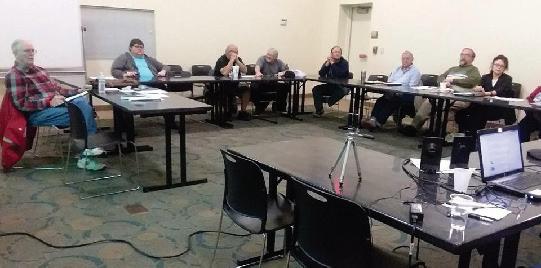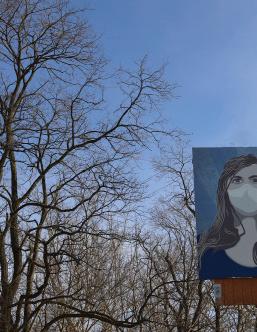
16 minute read
Reflecting a Region
This special feature takes a look at how Southeast Ohio, an area known for its resiliency and practicality, has adapted to the global pandemic.
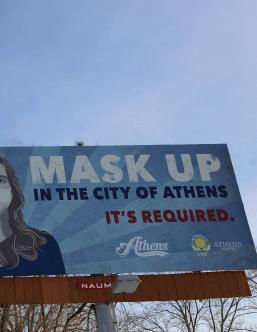
ABOVE: Bob O’Neil, co-owner of the Village Bakery and Café in Athens, has expanded online ordering and instituted weekly porch pickups. As of this writing, the business remains closed to indoor dining.
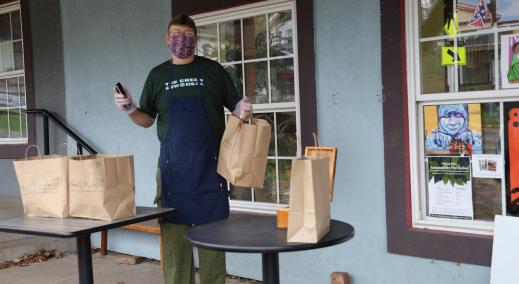
REFLECTING A REGION
Southeast Ohio in the Time of COVID-19
STORY BY ASHTON NICHOLS, KERI JOHNSON, ETHAN SANDS, IAN MACKENZIE, BRANDON MONTY, KELSEY LAURIEL, HAYLEE FOLLOWELL AND MADDI BUTINA
After a summer of lockdowns, people adapted to the “new normal” in the fall, with a mandated mask policy and many safety precautions statewide. Parents worked from home while their children received an education, right alongside them. Small businesses reopened under new guidelines, while others closed forever. Restrictions caused by COVID-19 led to the cancellation of concerts, weddings, large gatherings and vacations across the country.
While things may not go back to how they were, at Southeast Ohio, we captured these moments of people adapting to change. It’s a story of resiliency and how people adapted to numerous challenges throughout the year.
COMMERCE, CARRY-OUT & A CREATIVE APPROACH
Wittich’s Candy Shop has survived the Civil War, World War I, the Spanish Flu, the Great Depression, World War II and now--the Coronavirus pandemic.
Gottlieb F. Wittich started the confectionery in Circleville in 1940 and it’s the nation’s oldest familyowned and operated candy shop.
Janet Wittich currently runs the store— the fourth generation to run the shop. The pandemic closed the shop for nearly all of April 2020. It was the only time the shop has closed for a long period of time, Wittich says.
For a few days, the store was open with reduced hours. Now, they are back to 9 a.m. to 5 p.m. Monday through Saturday. The shop was, and still is, offering curbside pickup for sweets.
“The shop is busier than it was before,” Jane says.
Dodson’s on Broadway in New Lexington closed its dining room when the pandemic started, but the restaurant stayed open for carryout. Owner Cheryl Dodson says the restaurant was prepared to transition to this format.
Overall, business in the dining room is down, but the community has been supportive and stuck by Dodson’s side. Dodson’s serves pizza, sandwiches, Stromboli and many sweet desserts.
“I would not trade (the customers) for a million dollars,” Dodson says. “I can’t say enough about them.”
The family-owned and operated Unicorn Wine Guild in Belpre did not have to close. As one of the only wine-making manufacturers in
Southeast Ohio, it was considered an essential business. The winery has 50 varieties of wine people can try, paired with meat and cheese boards as well as sandwiches, soup and salad. It is one of the only places in Southeast Ohio that sells wine-making equipment
The only events the business hosts are “how to make wine at home” classes. The classes are limited to six people at a time, Barbara Whitaker, the owner of the Unicorn Wine Guild, says.
Whitaker reports that more people are interested in making wine at home as a hobby. Making wine is a speedy process that can take as little as two weeks to make. And while the guild may have hit a bump in 2020, it hopes to accomplish its goals for 2021.
“We want to provide a pleasant experience for our customers and hopefully bring a bit of tourism in,” Whitaker says. “A lot of people on the weekend want to come down to this area.”
KEEPING IT LOCAL
Across the nation, local businesses have struggled to stay open, but Southeast Ohio’s unique character of loyalty and resourcefulness has helped keep mainstays in business.
Hometown Threads Ohio is a screen printing and embroidery business that serves schools and local businesses, but the Chillicothe shop closed for about two months due to the pandemic.
While the physical business was closed, the online store was still operating, Threads owner Ben Thompson says. During this time, he and his employees worked to make sure its online presence was improved by being more creative and connecting with their loyal customers.
Once the shop opened back up, Thompson saw a significant increase in their screen printing business because businesses started to reopen and needed uniforms for new employees.
ABOVE: Wittich’s Candy Shop in Circleville is open with reduced hours.
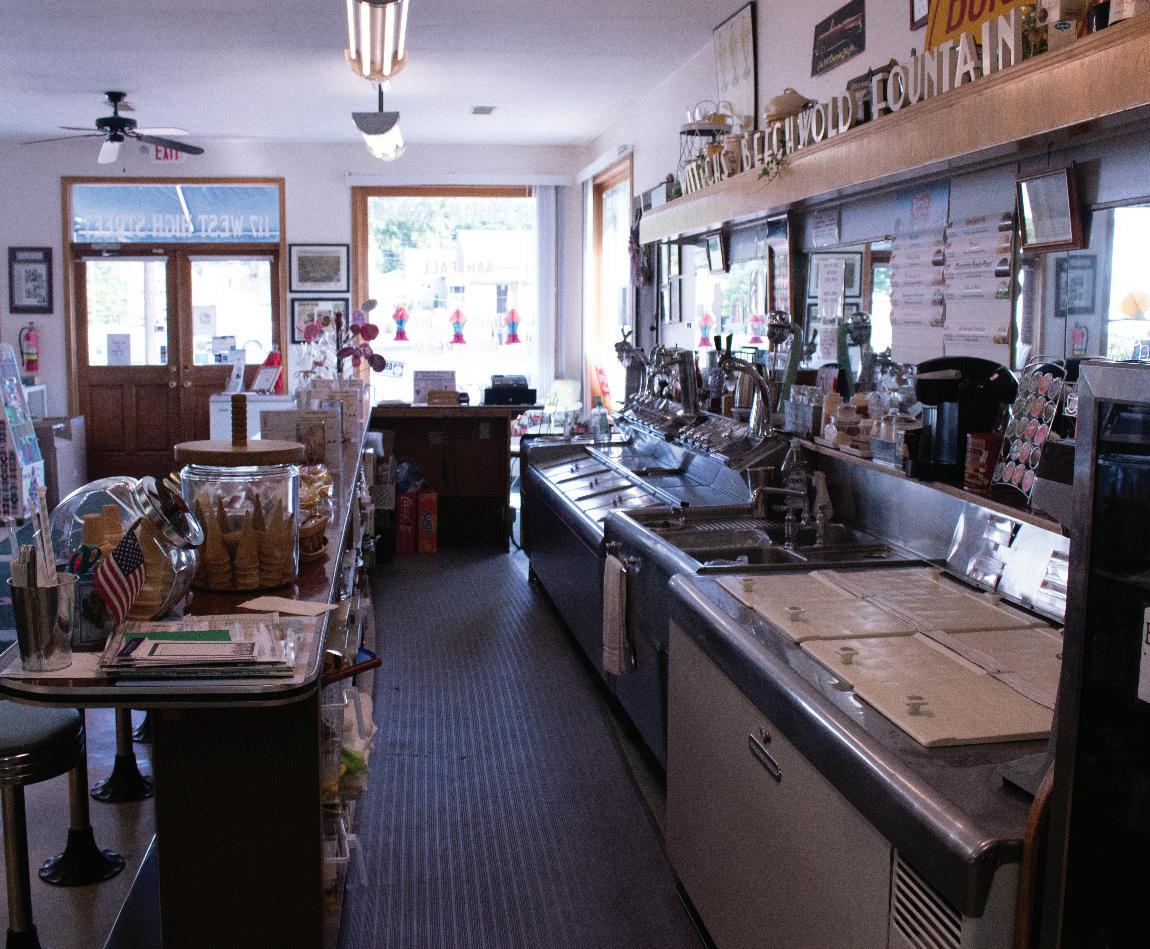
ABOVE: Children learning at the Child Development Center in Athens.
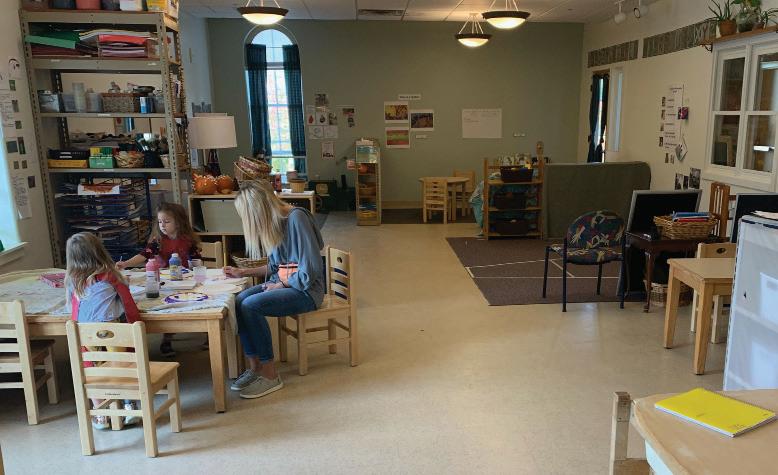
Customer loyalty was a huge help to Dad’s Primitive Workshop in Marietta, an antique, home décor and boutique shop.
The pandemic has negatively affected business, but its customer base has been very supportive, Charlie Clay, owner of the workshop, says.
To adapt, the business started a “Lunchtime Live” event on Facebook at noon on weekdays where people can virtually get together and the shop sells about 20 items. The shop has also been selling more items online.
Hornor and Harrison in Parkersburg, West Virginia, is a clothing store that offers tailoring, rentals and formal wear attire.
The store was closed for six weeks during the start of the pandemic, David Boone, the owner of the store, says. It has also shifted to offering more casual clothes, other than formal clothes, because the wedding business is still good.
One business that has seen an uptick in sales is David White Services, which specializes in heating and cooling equipment as well as installing fireplaces and stoves. They have offices in Athens and Lancaster and serve most of the area. They never had to close,
ABOVE: Athens Middle School sits empty this fall school day as students work from home. School systems across the region have taken different approaches, ranging from in-person learning to blended learning to entirely online. With access to technology a factor, strategies have included bringing mobile hotspots to the houses without access, and loaning Chromebooks to kids without computers. Students, teachers and parents have had to continuously adapt as conditions and CDC guidelines change.
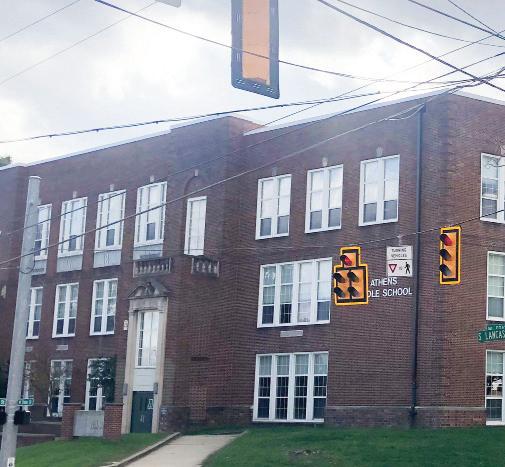
since their business is considered essential in Ohio, says Matthew Stallard, sales manager.
“We have not slowed down at all,” Stallard says. “As many members of our community are spending more time at home during the pandemic and want to make their homes as cozy and secure as possible, we have seen a dramatic increase in both fireplace and whole-house generator installations.”
IN THE CLASSROOM
This fall, students swapped lunch boxes for masks, classroom desks for home offices and classroom time for online learning. Some students began the semester online, while others went back to school.
April Stewart, director of online and blended learning at the Athens City School District, oversees communication with teachers, students and families.
With 26,000 students participating in online learning, issues have arisen with the virtual transition. WiFi access has been a major problem for rural areas. The Coronavirus Aid, Relief, and Economic Security Act (CARES Act) provided a grant for Chromebooks for Athens and Nelsonville students on a need-as basis, but the concern of connectivity remained.
Students have been able to access WiFi hotspots in a variety of ways. Ohio University (Athens) partnered with the Athens City School District by offering designated parking spots with hotspot capabilities.
“It’s a really positive thing to see how people come together during a stressful situation,” Stewart says.
Students who opted for blended learning were slowly phased in at the end of November. The phasein process included two groups of students at half-capacity. The
om home. School systems across the region have taken different approaches, ranging from in-person learning to blended learning to entirely online. With access to technology a factor, strategies have included omebooks to kids without computers. Students, teachers and parents have had to continuously adapt as conditions and CDC guidelines change.

students either attended classes on Tuesday and Wednesday or Thursday and Friday. All students had class online on Monday.
Other preventative measures include mandated mask policies, handwashing stations and hand sanitizer in every room.
While some parents have opted to keep their children remote for the semester, Jeremiah Johnson chose to send his 8-year-old daughter, Sierra, back to Wellston Intermediate for in-person classes.
Johnson says classes for Sierra started out hybrid, with in-person classes two days a week, which lasted three weeks. Then she went back five days a week and continued that routine for the rest of the semester.
“I have not been worried about it, mainly because my job is way more likely to be the bane of transmission,” Johnson says.
Sierra has to wear a mask unless she is eating, and the seats in classrooms are socially distanced. There are 15 students in her third grade class.
Johnson has not been able to meet any of his daughter’s teachers. Normally, he would go to orientation, parent-teacher meetings and be involved with her classroom.
Students at River Valley High School (RVHS), in Gallia County, attended classes in-person the entire fall. Extra precautions, such as wiping down surfaces and using hand sanitizer, are in place, alongside the state-mandated mask policy. Students also have assigned seats at lunch to limit interaction and make contact tracing easier.
Brea McClung, an American History teacher at RVHS, has 22 students in her class, and says socially distancing is a challenge. McClung is still doing everything in her power to keep her students and herself safe.
McClung says the most challenging part of teaching during the pandemic is getting to know her students. Seeing her students’ faces for the first time after bringing them outside for a project brought tears to the teacher’s eyes.
“When kids are in a mask, you only get to know them from the mask up,” McClung says. “That’s 150+ names just attached to eyeballs ... It’s not the easiest task.”
To help, RVHS started “Project Smile,” which features photographs of teacher and student smiles posted throughout the building’s hallways.
INTO THE WILD
During the pandemic, outdoor establishments have been busier than ever. When Ohio’s recreational facilities and parks reopened at the end of May, many individuals flocked to the outdoors in search of sociallydistanced hobbies such as hiking, camping, canoing, kayaking and horse riding.
Due to high demand, many retailers are running low on bikes,
- Bernie Roell
canoes and kayaks. Outdoor business owners, such as Bernie Roell of Murray’s Landing have taken notice.
“Once restrictions were lifted, then I think people were anxious to get out and do something. Since a lot of restaurants, movie theaters and other activities were still closed, outdoor activities went through the roof,’ Roell says.
Located just outside of Hocking Hills, Murray’s Landing opened in 2017 and offers three different trips via canoe, kayak or tube. The canoe and kayak livery also includes a campground overlooking the Hocking River where patrons can fish and utilize fire rings and picnic tables. The business has plans to open a second location in Nelsonville.
With more patrons lies greater responsibility for businesses. Cleaning guidelines must be followed strictly, especially in public areas such as bathrooms, showers and drinking fountains.
“We take good care of our place and do a good job of cleaning,” Roell says. “The nice part is that with the campground a lot of things were already social distanced, so the changes there really weren’t all that drastic.” Adjusting has not been as easy for Southern Ohio Hunting Preserve.
“We were closed down for about three months, but things have picked back up recently,” owner Butch Alexander says.
The preserve offers lodging, weddings and a variety of different
ABOVE: The Rostetter family from Shaker Heights hikes Cantwell Cliffs in Logan. Northern Ohioans have been traveling south to enjoy warmer temperatures and the area’s natural beauty. Pictured left to right: Sam, Matthew, Lucy and Grace.
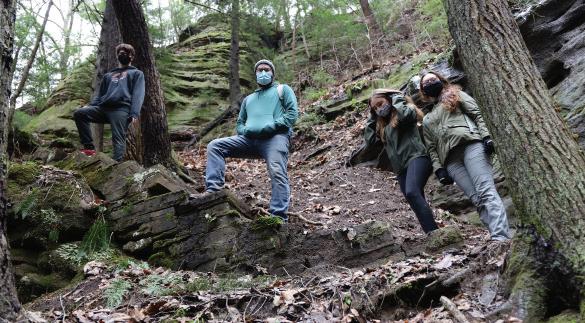
animals to hunt on its 600-acre preserve.
Alexander says that all patrons receive masks and cleaning supplies upon arrival. Hunters only pay for what they harvest, with pricing varying by animal.
Outdoor businesses also altered transportation. Given that some trails and rivers are miles away from check-in and registration desks, participants often use bus transportation provided by businesses to reach their destinations.
Hocking Hills and Adventures limits its seating on buses to every other seat as a safety measure, along with a mask-mandate. Assistant to the president of operations Marty Smith says that for the most part, customers have been understanding and cooperative.
“Bus transportation has cost us the most in business since we have to separate each party to every other seat,” Smith says. “Getting people to wear masks on the transportation has been difficult at times as well, but we just want to ensure that we are keeping people as safe as possible.”
Even with limitations, outdoor business owners and employees such as Smith have been amazed at how business spiked over the summer.
“The cabins have been consistently booked since we opened,” Smith says. “We have to allow a day between stays for cleaning. There’s a little bit of breathing space between stays for employees to clean, and we’ve had no issues with the cabins this year.”

LOVE AND MARRIAGE IN THE TIME OF COVID-19
When Haylee Hogan first imagined her wedding, her dream did not involve masks, social distancing and hand sanitizer party favors.
“My wedding was originally supposed to be outdoors, but due to bad weather we were forced to move inside,” says Hogan, who got married at The Farmers Daughters and Son wedding venue in Marietta. “This forced many people to have to leave immediately after the ceremony because it was unsafe to have so many people so close together.”
LEFT: Murray’s Landing has been bustling with activity as homebound residents seek refuge in the outdoors.
Cedar Grove Lodging in Logan has been able to run weddings and enforce safety precautions as well, says Amy Mecum, general manager.
Guidelines for gatherings from the CDC require all guests and staff to wear masks. Cedar Grove has also limited capacity and assigned one staff member to each event to disinfect high-touch surfaces, like bathrooms and tables.
“We found planning COVIDstyle weddings challenging at first,” Mecum says. “To be sure we are taking every safety precaution, the event manager and I meet weekly to discuss our upcoming events and COVID procedures.”
Beth Flick, founder of BFlick Photography, experienced a surplus of business after the stay at home order was lifted.
Flick is a wedding and family photographer. She normally shoots about 12 weddings a year, but by the end of 2020, she will have shot 17.
“I’m not exactly sure why my business has done better this year than previous years,” Flick says. “It could be families are just really valuing family time ... and want to
capture family memories.”
Flick says all the weddings she shot this year have been different. Some customers rescheduled until 2021, while others had small ceremonies of 10 to 15 people.
Mateja Holter also experienced significant change to her business. Holter is the owner and designer of Orchard Floral, which she runs from her home in Athens.
When delivering flower orders, Holter wears a mask and refrains from coming into physical contact with customers. As for in-person consultations with brides, Holter tries to meet them outdoors, but also does consultations over email and phone.
“I’ve had two weddings downsize, which usually means the guest size and the flowers decrease as well,” Holter says. “But it was very cool to see how some brides were able to really enjoy a more intimate wedding.”
THE FUTURE OF FAITH
With singing a means of transmission and tightly packed pews now a public health hazard, churches, temples and other religious spaces have had to alter operations to move forward in faith.
Hillel in Athens used to bustle on Shabbat, the Jewish holy day. Attendees would be greeted at the door, have dinner and hold hands for blessings.
Now, the building is on lockdown and services are held online. Students are no longer allowed to study in the building, intern Hannah Movshin says. To-go Shabbat meals are taken to the elderly. Activities are held on Zoom and Facebook Live as members now make and maintain connections virtually.
Fellowship of Faith, a church in Gallia County, leaned on the medical professionals in its congregation to help transition the church into safer protocols.
“This meant we may have taken things a bit more seriously than other churches in the area,”
ABOVE: A scene at a pandemic wedding captured by Beth Flick.

ABOVE: Socially distanced service at the Athens Unitarian Universalist Church.
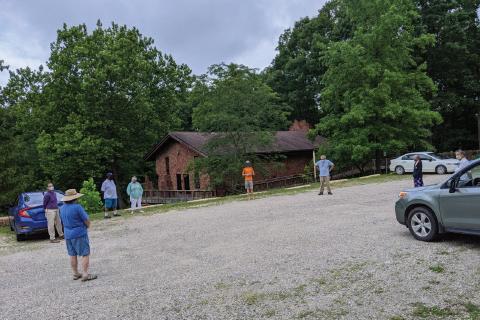
ABOVE: A sampling of completed masks sewn by Adrienne Nagy.
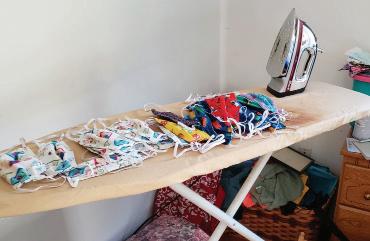
lead pastor Jamie Sisson says in an email, “we made decisions based on the information at the time.”
The church opened in June, but closed again July through August. When it reopened in August, Sisson reports that people were much more willing to follow guidelines.
The church streamed services from an empty auditorium. Inperson activities such as Bible studies and service projects were canceled.
Members have shared how they take virtual Communion: “We had quite a few using cookies and milk. Goldfish were a popular choice, too,” Sisson says.
Sisson says now, people know worship isn’t “defined by a building or a set time of the week. It is a frame of mind.”
TOGETHERNESS
Though the pandemic requires social distancing, it hasn’t stopped Southeast Ohio residents from helping their neighbors.
This past spring, when novice sewer Meg Dillon saw local and state hospitals suffering from PPE shortages, she knew she had to help. Dillon started a service organization virtually -- on Facebook.
What is now MasksNow Southeast Ohio started out as “Mask Makers of Athens County”. The Facebook group–all volunteers, from master seamstresses to sewing hobbyists–united to make masks.
Dillon, an IT business analyst in OIT at Ohio University (Athens), says she’s made well over 1,000 masks for the project. Many of her masks are free and donated. It isn’t unusual for the group’s members to boast numbers like these; Adrienne Nagy, a pediatric therapist from Amesville, has given away over 400 homemade masks and her daughter, Anna Heinrich, from Athens, has made more than 1,100.
Nagy started making masks because she saw a shortage in a niche need — masks for children who rely on central feeding tubes.
Nagy started with scrap fabric and a pattern she found online from Deaconess Hospital in Illinois. She gives away most of her masks for free. She once donated 46 masks in one drop-off to Amesville Elementary.
“I think it’s an important thing to help the spread of COVID. I am very much pro-mask,” Nagy says.
Dillon estimates it takes her 5-10 minutes to make a mask. She’s never done anything like this before, she says.
Dillon is immunocompromised and grateful for those wearing masks in public. For her, maskmaking is a satisfying volunteer experience.
“It is a really big chunk of time,” she says. “But it is incredibly rewarding.”
Dillon loves spotting her masks in the wild. Sometimes she’ll see people and say to herself, “I think I made that mask.”
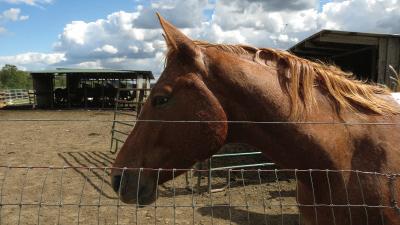
ABOVE: Spotted Horse Ranch offers guided horseback riding and camping for socially distanced recreation.








